语法与词汇--代词rd 文档
代词的语法知识点总结
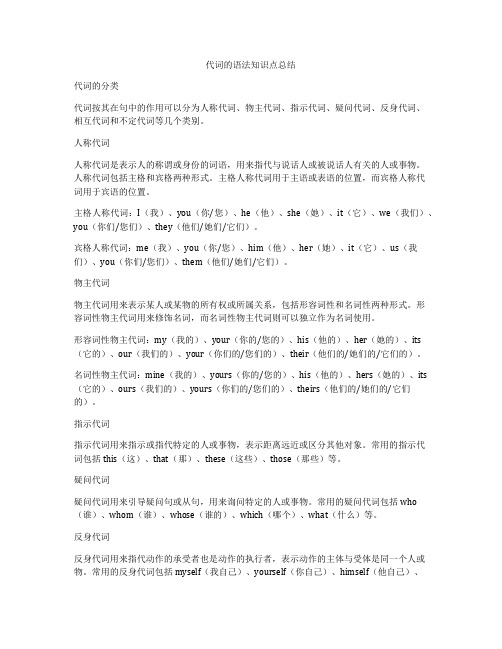
代词的语法知识点总结代词的分类代词按其在句中的作用可以分为人称代词、物主代词、指示代词、疑问代词、反身代词、相互代词和不定代词等几个类别。
人称代词人称代词是表示人的称谓或身份的词语,用来指代与说话人或被说话人有关的人或事物。
人称代词包括主格和宾格两种形式。
主格人称代词用于主语或表语的位置,而宾格人称代词用于宾语的位置。
主格人称代词:I(我)、you(你/您)、he(他)、she(她)、it(它)、we(我们)、you(你们/您们)、they(他们/她们/它们)。
宾格人称代词:me(我)、you(你/您)、him(他)、her(她)、it(它)、us(我们)、you(你们/您们)、them(他们/她们/它们)。
物主代词物主代词用来表示某人或某物的所有权或所属关系,包括形容词性和名词性两种形式。
形容词性物主代词用来修饰名词,而名词性物主代词则可以独立作为名词使用。
形容词性物主代词:my(我的)、your(你的/您的)、his(他的)、her(她的)、its (它的)、our(我们的)、your(你们的/您们的)、their(他们的/她们的/它们的)。
名词性物主代词:mine(我的)、yours(你的/您的)、his(他的)、hers(她的)、its (它的)、ours(我们的)、yours(你们的/您们的)、theirs(他们的/她们的/它们的)。
指示代词指示代词用来指示或指代特定的人或事物,表示距离远近或区分其他对象。
常用的指示代词包括this(这)、that(那)、these(这些)、those(那些)等。
疑问代词疑问代词用来引导疑问句或从句,用来询问特定的人或事物。
常用的疑问代词包括who (谁)、whom(谁)、whose(谁的)、which(哪个)、what(什么)等。
反身代词反身代词用来指代动作的承受者也是动作的执行者,表示动作的主体与受体是同一个人或物。
常用的反身代词包括myself(我自己)、yourself(你自己)、himself(他自己)、herself(她自己)、itself(它自己)、ourselves(我们自己)、yourselves(你们自己)、themselves(他们自己/她们自己/它们自己)。
完整word版,初中英语语法大全[知识点总结可打印]
![完整word版,初中英语语法大全[知识点总结可打印]](https://img.taocdn.com/s3/m/6ad34dc51a37f111f0855b3e.png)
英语语法大全初中英语语法学习提纲一、词类、句子成分和构词法:1、词类:英语词类分十种:名词、形容词、代词、数词、冠词、动词、副词、介词、连词、感叹词。
1、名词(n.):表示人、事物、地点或抽象概念的名称。
如:boy, morning, bag, ball, class, orange.2、代词(pron.):主要用来代替名词。
如:who, she, you, it .3、形容词(adj..):表示人或事物的性质或特征。
如:good, right, white, orange .4、数词(num.):表示数目或事物的顺序。
如:one, two, three, first, second, third, fourth.5、动词(v.):表示动作或状态。
如:am, is,are,have,see .6、副词(adv.):修饰动词、形容词或其他副词,说明时间、地点、程度等。
如:now, very,here, often, quietly, slowly.7、冠词(art..):用在名词前,帮助说明名词。
如:a, an, the.8、介词(prep.):表示它后面的名词或代词与其他句子成分的关系。
如in, on, from, above, behind.9、连词(conj.):用来连接词、短语或句子。
如and, but, before .10、感叹词(interj..)表示喜、怒、哀、乐等感情。
如:oh, well, hi, hello.2、句子成分:英语句子成分分为七种:主语、谓语、宾语、定语、状语、表语、宾语补足语。
1、主语是句子所要说的人或事物,回答是“谁”或者“什么”。
通常用名词或代词担任。
如:I’m Miss Green.(我是格林小姐)2、谓语动词说明主语的动作或状态,回答“做(什么)”。
主要由动词担任。
如:Jack cleansthe room every day. (杰克每天打扫房间)3、表语在系动词之后,说明主语的身份或特征,回答是“什么”或者“怎么样”。
(完整word版)英语代词的用法全归纳(word文档良心出品).doc

英语词类英语中的词可以根据词义、语法功能和形式特征分为十大类,即名词(noun) 、代词 (pronoun) 、形容词 (adjective) 、副词 (adverb) 、动词(verb) 、数词 (numeral) 、冠词 (article) 、介词 (preposition) 、连词(conjunctions) 和感叹词 (interjection) 。
英语代词的用法全归纳一、定义与分类代词是代替名词及起名词作用的短语或句子的词。
代词根据其意思和用法可分为人称代词、物主代词、反身代词、指示代词、相互代词、疑问代词、连接代词、关系代词、不定代词九类。
综观历年高考情况,在这九类代词中,不定代词一直是高考英语的重点。
二:人称代词,物主代词,反身代词用法概述这三种代词都有人称(第一、二、三人称)的变化、数(单、复数)的变化,性(阴性、阳性、中性)以及格(主格、宾格)的变化。
物主代词又包括两种形式:形容词性物主代词和名词性物主代词。
特别注意:形容词性物主代词its 没有相应的名词性物主代词。
这三种代词的形式变化表如下:形容词名词性单复性人称主格宾格物主代反身代词数物主代词词单I 我Me 我My 我的Mine 我Myself 我第一数的自已人称复We 我们Us 我Our 我Ours 我Ourselves数们们的的东西我们自已单Your 你Yours Yourself You 你You 你 你的东 数的,你自已西 第二人称You 你 You 你 Your 你 Yours Yourselvs 复 你们的 数们们们你们自已东西He 他Him 他 His 他的 His 他的 Himself他自已单 She 她Her 她Her 她Hers 她 Herself 她 数的的东西 自已第三Itself 它自人称It 它It 她Its 它的 无已复 They 他 Them Their 他 TheirsThemselfs他们的数们他们们的他们自已东西三、人称代词的用法1) 定义:人称代词是用来指代人、动物或事物的代词。
中学语法大全代词
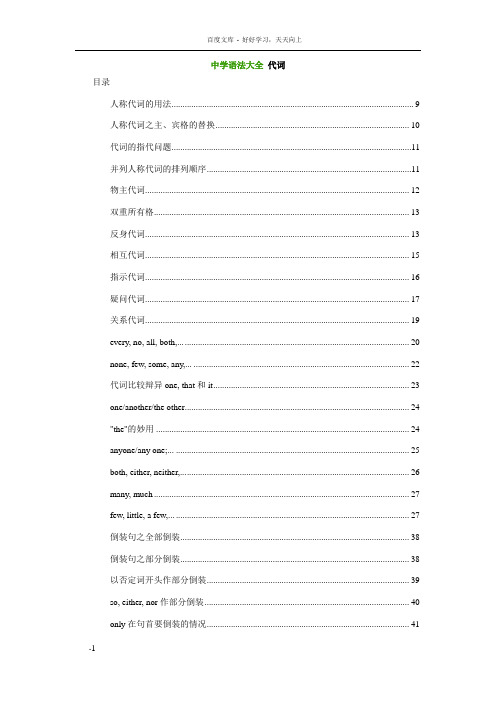
中学语法大全代词目录人称代词的用法 (9)人称代词之主、宾格的替换 (10)代词的指代问题 (11)并列人称代词的排列顺序 (11)物主代词 (12)双重所有格 (13)反身代词 (13)相互代词 (15)指示代词 (16)疑问代词 (17)关系代词 (19)every, no, all, both,... (20)none, few, some, any,... .. (22)代词比较辩异one, that和it (23)one/another/the other (24)"the"的妙用 (24)anyone/any one;... . (25)both, either, neither,... .. (26)many, much (27)few, little, a few,... . (27)倒装句之全部倒装 (38)倒装句之部分倒装 (38)以否定词开头作部分倒装 (39)so, either, nor作部分倒装 (40)only在句首要倒装的情况 (41)as, though引导的倒装句 (41)其他部分倒装 (41)定语从句 (52)关系代词引导的定语从句 (52)关系副词引导的定语从句 (53)判断关系代词与关系副词 (53)限制性和非限制性定语从句 (55)介词+关系词 (56)as, which非限定性定语从句 (56)先行词和关系词二合一 (57)what/whatever/that... (58)关系代词that的用法 (58)不定式作宾语 (67)不定式作补语 (69)不定式主语 (71)It's for sb/It's of sb (72)不定式作表语 (72)不定式作定语 (72)不定式作状语 (73)用作介词的to (73)省to 的动词不定式 (74)动词不定式的否定式 (75)不定式特殊句型too...to. (76)不定式特殊句型so as to (77)不定式特殊句型Why not (77)不定式的时态和语态 (77)动名词与不定式 (78)系动词 (89)什么是助动词 (91)助动词be的用法 (92)助动词have的用法 (93)助动词do 的用法 (93)助动词shall和will的用法 (94)助动词should, would的用法 (95)短语动词 (95)非谓语动词 (96)一般现在时的用法 (106)一般过去时的用法 (106)used to/be used to (108)一般将来时 (108)be going to/will (109)be to和be going to (110)一般现在时表将来 (110)用现在进行时表示将来 (110)现在完成时 (111)比较过去时与现在完成时 (111)用于现在完成时的句型 (113)比较since和for (114)since的四种用法 (115)延续动词与瞬间动词 (115)过去完成时 (116)用一般过去时代替完成时 (117)将来完成时 (118)不用进行时的动词 (119)过去进行时 (120)将来进行时 (121)一般现在时代替将来时 (121)一般现在时代替过去时 (122)一般现在时代替完成时 (122)一般现在时代替进行时 (122)现在进行时代替将来时 (123)时态一致 (123)时态与时间状语 (123)动词的语态 (133)let 的用法 (133)短语动词的被动语态 (134)表示"据说"或"相信"的词组 (134)不用被动语态的情况 (134)主动形式表示被动意义 (136)被动形式表示主动意义 (137)need/want/require/worth (137)动名词作主语、宾语和表语 (147)worth 的用法 (148)独立主格 (158)With的复合结构 (159)分词作定语 (170)分词作状语 (171)连词+分词(短语) (172)分词作补语 (172)分词作插入语 (173)分词的时态 (173)分词的语态 (174)不定冠词的用法 (184)定冠词的用法 (184)零冠词的用法 (186)冠词与形容词+名词结构 (187)冠词位置 (187)数词 (188)句子的种类 (198)祈使句 (200)感叹句结构 (201)强调句结构 (203)用助动词进行强调 (204)反意疑问句 (204)连词 (217)并列连词与并列结构 (218)比较and和or (219)表示选择的并列结构 (220)表示转折或对比 (220)表原因关系 (221)比较so和such (221)名词概论 (231)其它名词复数的规则变化 (232)名词复数的不规则变化 (233)不可数名词量的表示 (234)定语名词的复数 (235)不同国家的人的单复数 (236)名词的格 (237)名词性从句 (247)引导名词性从句的连接词 (247)名词性that-从句 (248)名词性wh-从句 (249)if, whether引导的名词从句 (250)否定转移 (251)情态动词的语法特征 (261)比较can 和be able to (261)比较may和might (262)比较have to和must (263)must表示推测 (263)表示推测的用法 (264)情态动词+have+过去分词 (265)should和ought to (266)had better表示最好 (266)would rather表示"宁愿" (267)will和would (267)情态动词的回答方式 (268)带to的情态动词 (269)比较need和dare (270)stop doing/to do (279)forget doing/to do (280)remember doing/to do (280)regret doing/to do (281)try doing/to do (282)go on doing/to do (282)be afraid doing/to do (282)be interested doing/... (283)mean doing/to do (283)begin(start) doing/to do (283)感官动词+ doing/to do (284)形容词及其用法 (293)以-ly结尾的形容词 (294)用形容词表示类别和整体 (294)多个形容词修饰名词的顺序 (295)副词及其基本用法 (296)兼有两种形式的副词 (297)形容词与副词的比较级 (298)as+形容词或副词原级+as (300)比较级形容词或副词+than (300)可修饰比较级的词 (301)many, old和far (302)the+最高级+比较范围 (303)和more有关的词组 (304)虚拟语气 (313)真实条件句 (314)非真实条件句 (315)混合条件句 (316)虚拟条件句的倒装 (316)特殊的虚拟语气词:should (317)比较if only与only if (319)It is (high) time that (319)need"不必做"和"本不该做" (320)主谓一致 (329)并列结构作主语谓语用复数 (330)主谓一致中的靠近原则 (330)谓语动词与前面的主语一致 (331)谓语需用单数 (331)指代意义决定谓语的单复数 (332)与后接名词或代词保持一致 (332)地点状语从句 (342)方式状语从句 (342)原因状语从句 (344)目的状语从句 (344)结果状语从句 (344)条件状语从句 (345)让步状语从句 (346)比较while, when, as (348)比较until和till (348)表示"一...就..."的结构 . (349)人称代词的用法1)人称代词的主格在句子中作主语或主语补语,例如:John waited a while but eventually he went home.约翰等了一会儿,最后他回家了。
初中英语语法-代词讲解(DOC)
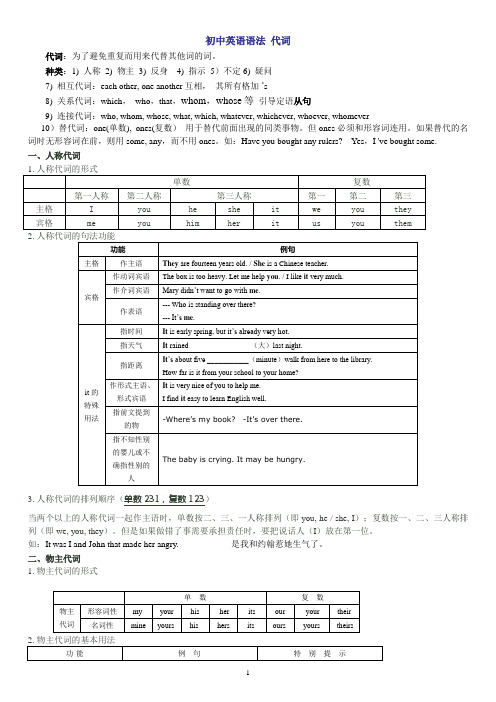
初中英语语法代词代词:为了避免重复而用来代替其他词的词。
种类:1) 人称2) 物主3) 反身4) 指示5)不定6) 疑问7) 相互代词:each other, one another互相,其所有格加-’s8) 关系代词:which,who,that,whom,whose等引导定语从句9) 连接代词:who, whom, whose, what, which, whatever, whichever, whoever, whomever10)替代词:one(单数), ones(复数)用于替代前面出现的同类事物。
但ones必须和形容词连用。
如果替代的名词时无形容词在前,则用some, any,而不用ones。
如:Have you bought any rulers?Yes,I 've bought some.一、人称代词2.3. 人称代词的排列顺序(单数231,复数123)当两个以上的人称代词一起作主语时,单数按二、三、一人称排列(即you, he / she, I);复数按一、二、三人称排列(即we, you, they)。
但是如果做错了事需要承担责任时,要把说话人(I)放在第一位。
如:It was I and John that made her angry. 是我和约翰惹她生气了。
二、物主代词1. 物主代词的形式2. 物主代词的基本用法3. 物主代词的特殊用法在双重所有格中只能用名词性物主代词。
如:我的一个朋友a friend of mine , 她的一个同学a classmate of hers , each brother of his.三、反身代词1. 反身代词的形式2. 反身代词的句法功能3.由反身代词构成的习惯用语① help oneself to 随便吃……② come to oneself 苏醒过来,醒悟,恢复知觉③ dress oneself 自己穿衣服④ say to oneself 自言自语⑤ enjoy oneself 玩得开心⑥ lose oneself in迷路于,全神贯注于…之中,消失于⑦ teach oneself 自学⑧ look after oneself ⑨by oneself 亲自learn……by oneself 自学…leave one by oneself 把某人单独留下hurt oneself 伤了自己make yourself/yourselves at home 不必拘束四、指示代词1. that 用来代替前面提到的不可数名词,those代替复数名词。
语法与词汇--代词rd文档
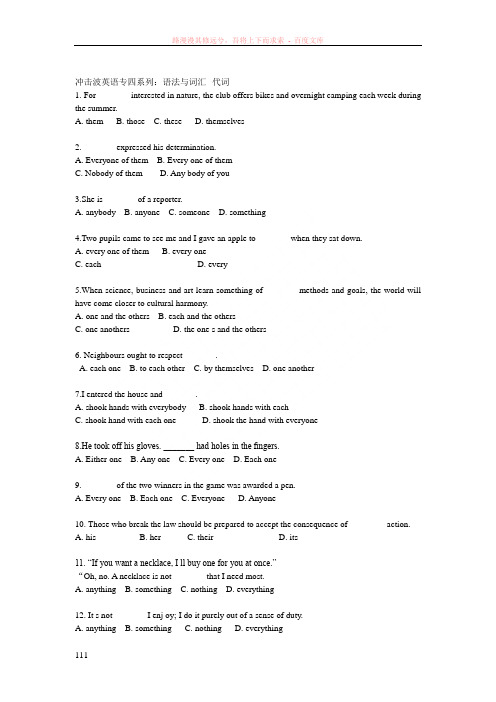
冲击波英语专四系列:语法与词汇--代词1. For _______ interested in nature, the club offers bikes and overnight camping each week during the summer.A. themB. thoseC. theseD. themselves2. _______ expressed his determination.A. Everyone of themB. Every one of themC. Nobody of themD. Any body of you3.She is _______ of a reporter.A. anybodyB. anyoneC. someoneD. something4.Two pupils came to see me and I gave an apple to _______ when they sat down.A. every one of themB. every oneC. eachD. every5.When science, business and art learn something of _______ methods and goals, the world will have come closer to cultural harmony.A. one and the othersB. each and the othersC. one anothersD. the one s and the others6. Neighbours ought to respect _______.A. each oneB. to each otherC. by themselvesD. one another7.I entered the house and _______.A. shook hands with everybodyB. shook hands with eachC. shook hand with each oneD. shook the hand with everyone8.He took off his gloves. _______ had holes in the fingers.A. Either oneB. Any oneC. Every oneD. Each one9. _______ of the two winners in the game was awarded a pen.A. Every oneB. Each oneC. EveryoneD. Anyone10. Those who break the law should be prepared to accept the consequence of ________ action.A. hisB. herC. theirD. its11. “If you want a necklace, I ll buy one for you at once.”“Oh, no. A necklace is not _______ that I need most.A. anythingB. somethingC. nothingD. everything12. It s not _______ I enj oy; I do it purely out of a sense of duty.A. anythingB. somethingC. nothingD. everything13.“Is he a boy with good manners? ”“No, he is _______ but polite.”A. anythingB. anyoneC. anywhereD. anybody14. Her father was _______ but a poet.A. anythingB. anyoneC. anywhereD. anybody15. Don t have him for a friend. He is _______ but a cheat.A. no oneB. nothingC. no whereD. nobody16. His kindness was _______ that we will never forget him.A. whatB. whichC. whoD. such17. No agreement was reached in the discussion as neither side would give way to _______.A. the otherB. any otherC. anotherD. other18. We had a party last month, and it was a lot of fun, so let s have _______ one this month.A. anotherB. moreC. the otherD. other答案解析1. B对于那些喜欢自然的人,夏季俱乐部每周提供自行车和短途野营。
初中代词语法大全(可编辑修改word版)
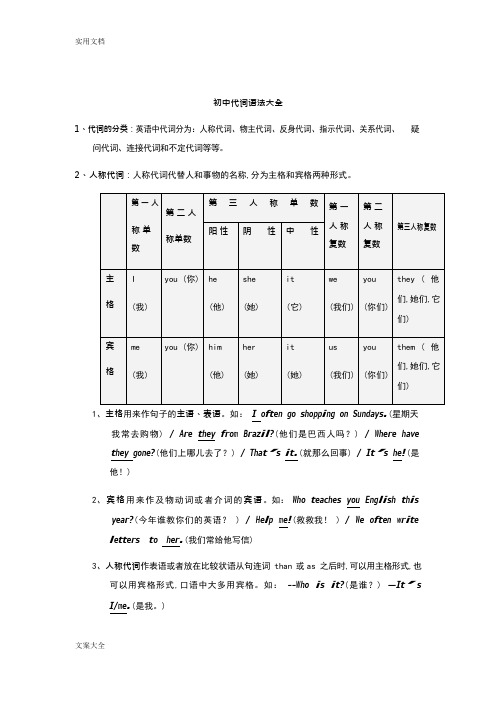
初中代词语法大全1、代词的分类:英语中代词分为:人称代词、物主代词、反身代词、指示代词、关系代词、疑问代词、连接代词和不定代词等等。
2、人称代词:人称代词代替人和事物的名称,分为主格和宾格两种形式。
1、主格用来作句子的主语、表语。
如:I o f t e n g o s h o pp i n g o n Sun d a y s.(星期天我常去购物) /A r e t h e y f r o m B r a z il?(他们是巴西人吗?) /W h e r e h a v et h e y g o n e?(他们上哪儿去了?) /T h a t’s i t.(就那么回事) /I t’s h e!(是他!)2、宾格用来作及物动词或者介词的宾语。
如:W h o t e a c h e s y o u E n g li s h t h i sy e a r?(今年谁教你们的英语? ) /H e l p m e!(救救我! ) /W e o f t e n w r i t el e tt e r s t o h e r.(我们常给他写信)3、人称代词作表语或者放在比较状语从句连词 than 或 as 之后时,可以用主格形式,也可以用宾格形式,口语中大多用宾格。
如:--W h o i s i t?(是谁?) –I t’s I/m e.(是我。
)4、三个不同人称同时出现,或者主语中包含“我”时,按照“you→he→I”的顺序表达。
如:B o t h h e a n d I a r e w o r k i n g a t t h a t c o m p u t e r c o m p a n y.(我和他都在那家电脑公司上班) –W h o w ill g o t h e r e?(谁要去那儿?) –Y o u a n d m e.(你和我)5、人称代词it 除了可以指人指物之外,还可以表示“时间、天气、温度、距离、情况”等含义,此外还可以作“非人称代词”使用,替代作主语或者宾语的不定式、动名词或者名词性从句。
(完整版)代词知识点总结
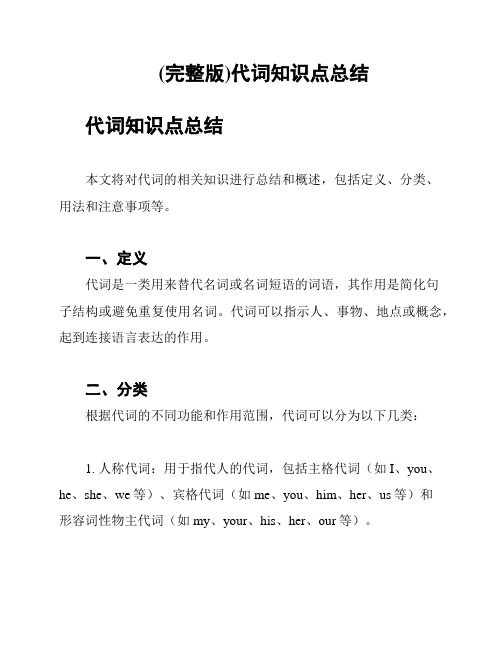
(完整版)代词知识点总结代词知识点总结本文将对代词的相关知识进行总结和概述,包括定义、分类、用法和注意事项等。
一、定义代词是一类用来替代名词或名词短语的词语,其作用是简化句子结构或避免重复使用名词。
代词可以指示人、事物、地点或概念,起到连接语言表达的作用。
二、分类根据代词的不同功能和作用范围,代词可以分为以下几类:1. 人称代词:用于指代人的代词,包括主格代词(如I、you、he、she、we等)、宾格代词(如me、you、him、her、us等)和形容词性物主代词(如my、your、his、her、our等)。
2. 物主代词:用于指代和表示所属关系的代词,包括形容词性物主代词(如my、your、his、her、our等)和名词性物主代词(如mine、yours、his、hers、ours等)。
3. 指示代词:用于指示人或事物的代词,包括近指示代词(如this、these)和远指示代词(如that、those)。
4. 疑问代词:用于提问的代词,包括“谁”、“什么”、“哪一个”等,如who、what、which、whose等。
5. 相对代词:用于引导定语从句的代词,如that、which、who 等。
6. 不定代词:用于泛指或不确定指代的代词,如somebody、anybody、something、anything等。
三、用法代词的用法主要包括以下几种:1. 代替主格代词作为主语:- 例如:He is a teacher. → He likes his job. → It is a great job.He likes his job. → It is a great job.2. 代替宾格代词作为宾语:- 例如:She loves you. → She loves you very much. → She loves you very much.you very much. → She loves you very much.3. 代替名词作为宾语补足语:- 例如:I find the article interesting. → I find it interesting.it interesting.4. 代替名词作为同位语:- 例如:The fact is undeniable. → This is undeniable.This is undeniable.5. 代替名词作为定语:- 例如:I lost my phone. → My phone is lost.My phone is lost.6. 表示非特定指代或泛指:- 例如:Somebody called you. → They didn't leave amessage.They didn't leave a message.7. 表示指示或引导注意:- 例如:This is the book I mentioned. → This is the book.This is the book.四、注意事项在使用代词时,需要注意以下几点:1. 确保代词与所指代的名词或名词短语在人称、数和格等方面保持一致。
- 1、下载文档前请自行甄别文档内容的完整性,平台不提供额外的编辑、内容补充、找答案等附加服务。
- 2、"仅部分预览"的文档,不可在线预览部分如存在完整性等问题,可反馈申请退款(可完整预览的文档不适用该条件!)。
- 3、如文档侵犯您的权益,请联系客服反馈,我们会尽快为您处理(人工客服工作时间:9:00-18:30)。
冲击波英语专四系列:语法与词汇--代词1. For _______ interested in nature, the club offers bikes and overnight camping each week during the summer.A. themB. thoseC. theseD. themselves2. _______ expressed his determination.A. Everyone of themB. Every one of themC. Nobody of themD. Any body of you3.She is _______ of a reporter.A. anybodyB. anyoneC. someoneD. something4.Two pupils came to see me and I gave an apple to _______ when they sat down.A. every one of themB. every oneC. eachD. every5.When science, business and art learn something of _______ methods and goals, the world will have come closer to cultural harmony.A. one and the othersB. each and the othersC. one anothersD. the one s and the others6. Neighbours ought to respect _______.A. each oneB. to each otherC. by themselvesD. one another7.I entered the house and _______.A. shook hands with everybodyB. shook hands with eachC. shook hand with each oneD. shook the hand with everyone8.He took off his gloves. _______ had holes in the fingers.A. Either oneB. Any oneC. Every oneD. Each one9. _______ of the two winners in the game was awarded a pen.A. Every oneB. Each oneC. EveryoneD. Anyone10. Those who break the law should be prepared to accept the consequence of ________ action.A. hisB. herC. theirD. its11. “If you want a necklace, I ll buy one for you at once.”“Oh, no. A necklace is not _______ that I need most.A. anythingB. somethingC. nothingD. everything12. It s not _______ I enj oy; I do it purely out of a sense of duty.A. anythingB. somethingC. nothingD. everything13.“Is he a boy with good manners? ”“No, he is _______ but polite.”A. anythingB. anyoneC. anywhereD. anybody14. Her father was _______ but a poet.A. anythingB. anyoneC. anywhereD. anybody15. Don t have him for a friend. He is _______ but a cheat.A. no oneB. nothingC. no whereD. nobody16. His kindness was _______ that we will never forget him.A. whatB. whichC. whoD. such17. No agreement was reached in the discussion as neither side would give way to _______.A. the otherB. any otherC. anotherD. other18. We had a party last month, and it was a lot of fun, so let s have _______ one this month.A. anotherB. moreC. the otherD. other答案解析1. B对于那些喜欢自然的人,夏季俱乐部每周提供自行车和短途野营。
代词。
指示代词包括this, that, these, those, 当后面有修饰语时,通常使用that或those。
2.B他们每个人都表述了决心。
代词。
与of搭配使用的代词为every one, some one, any one等。
3.D他算是个记者吧。
代词。
something of(a )表示“有几分,有一点儿,可以说是”。
much of有类似用法,如He is not much of a scholar.(他没有多少学问/他算不上是个有学问的人。
)4.C两个学生来看我,他们坐下后我给了每人一个苹果。
代词。
each用作代词是指代两个人或物中的一个,而every则指代三个或三个以上中的一个。
5.C当科学、商业和艺术学习彼此的方法和目标时,世界就更接近文化和谐了。
代词。
each other指二者间的相互关系,而要指三者以上的相互关系则使用one another 。
6.D邻里间应该互相尊重。
代词。
解析同上。
7.A我进了屋子和大家握手。
代词。
each往往指代上下文提到过的人或物,若没提到,就不能用each ,只能用everyone ,everybody等。
8.D他脱下手套。
每只手套的手指处都有洞。
代词。
解析同4 。
9. B两名比赛获胜者每人发了一支钢笔。
代词。
解析同4 。
10.C违法的人应该准备好承担其行为的后果。
代词。
此处所缺是能够指代主语的代词,主语中心词those ,复数形式,应选择C。
11.B“如果你想要项链,我立刻买给你。
”“哦,不。
项链并不是我最需要的东西。
”代词。
此题容易误选A ,机械地套用以下规则:something 用于肯定句,anything用于否定句或疑问句。
当然此规则在通常情况下是有效的,但此句不属通常用法。
此题的最佳答案应是B,something 在此的意思不是“某种东西”,而是指“那种东西”或“这种东西”,即心中最想要的那种东西(相当于the thing) 。
12.B这不是我喜欢的事儿;完全出于责任感我才这么做。
代词。
解析同11。
13.A“他是个懂礼貌的孩子吗?”“不是,他一点儿也不懂礼貌。
”代词。
此题容易误选B,D ,因为句子主语是he ,所以这里只能选B ,D表示“人”;其实此题应选A 。
因为anything but 是一个习语,意为“根本不是”或“一点儿也不”,可用于人或事物。
14. A她父亲根本不是诗人。
代词。
解析同13。
15.B不要和他交朋友,他是个骗子。
代词。
nothing but意为“只有……,只不过是……”,可用于指人或事物。
16.D他是如此和蔼,让我们永远都忘不了他。
代词。
代词such表示“(达到)如此程度”,后接that-从句,表达因果关系。
17.A讨论没有达成一致意见,因为没有一方愿意向另一方让步。
代词。
the other表示特指,指前提已有两件事或两种东西,在提到一个,又提另一个时使用。
根据本题中neither side可知此题中讨论方为两者,故选A。
any other表示“任何别的”;another强调在没有前提与范围的情况下,提到一件事或一个东西之后,又提到另一个时使用;other表示一定范围内的“其他的”,而且其后一般用可数名词的复数形式。
18.A上月我们举行了一次晚会,大家玩得都很高兴,所以这个月我们再举行一次吧。
代词。
解析参考17。
B项more的语序有误。
